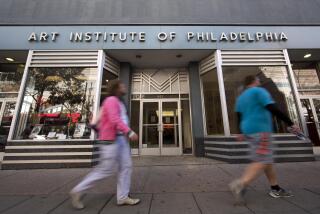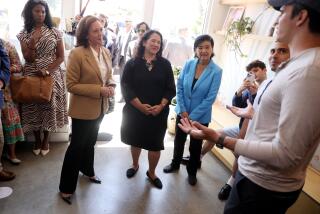Small Businesses Get a Lesson in Economy From Students : Survival: SDSU course lets students tackle real-world tasks, such as writing business plans, and saves companies big bucks.
As tough times force more small companies to search out ways of building sales and convincing stingy lenders to make loans, increasing numbers of firms are hiring consultants to prepare business plans, a marketing tool that can cost upward of $10,000.
But there’s a cheaper alternative for both financially ailing companies and those trying to grow.
Over the past 20 years, more than 1,000 small companies in San Diego County have received quality business consulting free of charge from San Diego State University business students who are supervised by business professors and retired executives.
The services are offered through SDSU’s Small Business Institute, which is backed financially by the federal Small Business Administration.
“I had considered hiring consultants, but decided to go this route,” said Ahmad Paksima, president of a San Diego pastry wholesaler called Chewys Rugulach. “Small businesses can’t afford these $15,000 to $20,000 business studies by consultants.”
SBI recently provided Paksima with two teams of students to analyze his business and develop a marketing and growth strategy. The first team prepared a study on which markets he should target and how he could obtain funds for expansion.
The second team looked at whether it made sense for Paksima to continue selling his product--a cream cheese pastry sold in 40 states--on display stands in food stores, or to sell it in rented space within a store or in completely separate franchises dedicated to the pastries.
“Anytime business owners want to market something, they always look at it subjectively,” he said. “But the students look at it from an objective point of view, and they give you a blueprint of what all your thoughts are for your business.”
Students majoring in accounting, marketing, finance, real estate, management or computer science get college credit for spending three months during a semester helping businesses develop business plans. The students, which spend about 100 hours each on an SBI project, are not graded on their work until their professors deem it complete.
In groups of three or four, the students--most are seniors--tackle real-world tasks, such as budget overhauls, marketing strategies and computerization of operations. They design logos, estimate the cost of products, find manufacturers for products and conduct consumer surveys. And, perhaps most important, the students write business plans.
“The end result is that the students provide a marketing or business plan that the business owner can take to a lender or use themselves to run a business. Very few people know about this program, I think it’s one of SBA’s best-kept secrets,” said Delores Braswell, who coordinates the program for the SBA.
Yet more and more businesses are seeking help from the government.
“As the recession continues, we’re seeing more and more people” applying for help from the SBI program, said Howard Toole, an SDSU accounting professor who co-directs the program. “We’re trying to keep businesses afloat so they can make it to the turnaround” in the economy.
This semester, for instance, one team of SBI students is helping a local nursery automate its inventory control system, Toole said, and another team will assist a dentist in promoting and finding a manufacturer for a new invention for eliminating the pain involved with some dental work.
The SBI program applies only to businesses that have been operating at least a year and that are clearly in a financial position to keep their doors open for the length of the students’ project. Most of the businesses helped so far have between one and 100 employees.
“For a small business person who doesn’t have an ample marketing and development budget, these students are wonderful,” said Judi Willkins, owner of Better Worlde Galleria in Mission Hills. Last year she received consulting services from two groups of students. “They’re educated enough so that their enthusiasm is well directed. Their work helped me from continuing in the direction I was taking my business.”
Willkins had considered taking out an SBA loan and expanding her business by moving into a bigger shop in Old Town, but was better advised by the students, she said, to forgo the loan and move into a bigger store across the street in Mission Hills.
Businesses such as Willkins pay nothing for the SBI program because it is sponsored by the SBA, which gives SDSU $500 for each client. That money supports the professors who manage the program and pays for business-oriented computer software and other supplies the students need to help their clients.
Two SDSU faculty members match applicant businesses and teams of three or four students who have taken course work in the appropriate areas, such as accounting or marketing. Often, the number of businesses SBI can help depends on what the clients’ needs are and how many students with matching skills have signed up for the course.
Once students are assigned to a team that will work with a client, a member of the SBA’s Service Corp. of Retired Executives (SCORE) counsels the students and ensures that the projects are completed properly and meet the clients’ needs.
“You’d be surprised at how good of a job that some of these students do,” said Verl Schuft, a SCORE counselor who until recently was in charge of SCORE’s involvement with the SBI program. “When you look at the reports they do and compare them to those put together by professionals for between $10,000 and $25,000, I’d say there are very few cases where the government isn’t getting its money ($500 per client) out of the program. What’s spent is peanuts.”
Braswell of the SBA said her follow-up interviews with clients of the SBI program show that about 90% were pleased with the students’ work.
“Oftentimes with those who are not pleased with the results, it’s a case where the students (studied the business) and came to conclusions that are contrary to the owners preconceived notions,” Braswell said. “Generally when there’s a difference of opinion, the students have the facts to back their work up.”
Another common problem, she said, is that business owners often agree to release all financial information, which is held confidential by those in the SBI program, but then renege when students are gathering the information they need to write their reports. In that case, she said, students are frustrated and the client gets a second-rate report.
On the other hand, the students are not professionals, and, in a small number of cases, a client’s dissatisfaction with the work is due to the students’ negligence, according to several sources who oversee the SBI program. Theoretically, the involvement of two SDSU professors, the SBA and SCORE members will prevent clients from being left with shoddy reports.
Though SBI clients are not charged for the students’ work, they pay with their time:
“From my standpoint, you have to spend a lot of time with the students in order to get something out of the program,” business owner Willkins said. “They evaluated my existing finance, marketing and sales picture and then went over all my records before putting together a three-year (business) plan.”
SDSU was one of the founding institutions behind the nationwide Small Business Institute, which is found at about 600 universities, Toole said.
“From day one, the goal of SBI was to get students out of the classroom and out providing services for businesses that could not otherwise afford them,” he said.
Though many SBI clients have years of experience in running a small business, Toole said, the students can bring the nuts-and-bolts business sense that lies in textbooks that many business owners have never opened.
More to Read
Inside the business of entertainment
The Wide Shot brings you news, analysis and insights on everything from streaming wars to production — and what it all means for the future.
You may occasionally receive promotional content from the Los Angeles Times.










